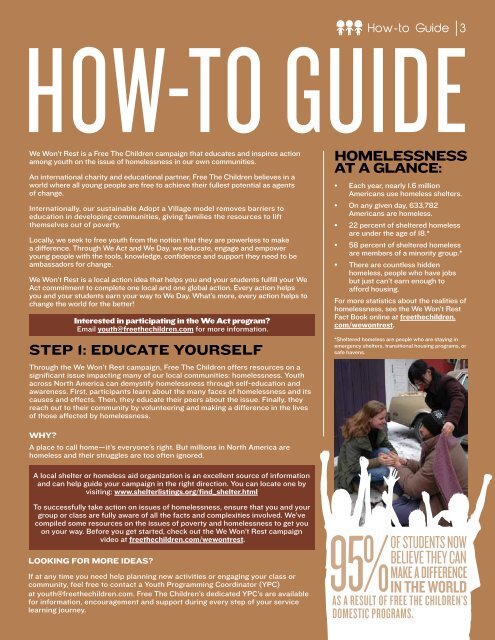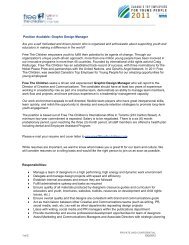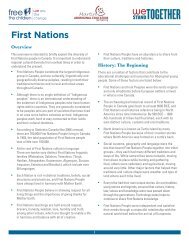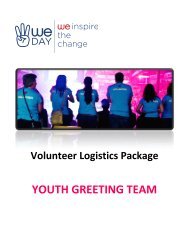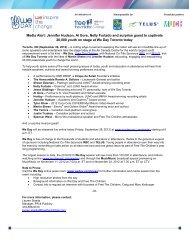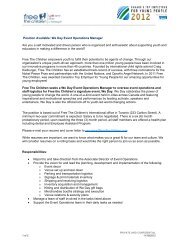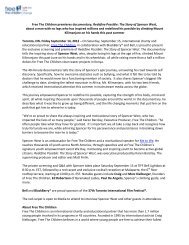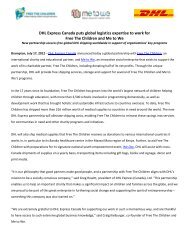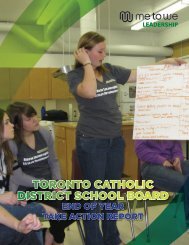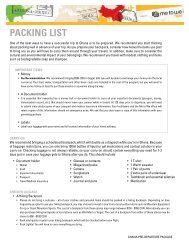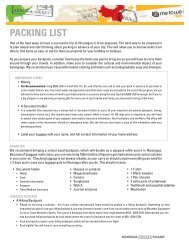believe THey can - Free The Children
believe THey can - Free The Children
believe THey can - Free The Children
Create successful ePaper yourself
Turn your PDF publications into a flip-book with our unique Google optimized e-Paper software.
How- to Guide | 3<br />
How-To Guide<br />
We Won’t Rest is a <strong>Free</strong> <strong>The</strong> <strong>Children</strong> campaign that educates and inspires action<br />
among youth on the issue of homelessness in our own communities.<br />
An international charity and educational partner, <strong>Free</strong> <strong>The</strong> <strong>Children</strong> <strong>believe</strong>s in a<br />
world where all young people are free to achieve their fullest potential as agents<br />
of change.<br />
Internationally, our sustainable Adopt a Village model removes barriers to<br />
education in developing communities, giving families the resources to lift<br />
themselves out of poverty.<br />
Locally, we seek to free youth from the notion that they are powerless to make<br />
a difference. Through We Act and We Day, we educate, engage and empower<br />
young people with the tools, knowledge, confidence and support they need to be<br />
ambassadors for change.<br />
We Won’t Rest is a local action idea that helps you and your students fulfill your We<br />
Act commitment to complete one local and one global action. Every action helps<br />
you and your students earn your way to We Day. What’s more, every action helps to<br />
change the world for the better!<br />
Interested in participating in the We Act program?<br />
Email youth@freethechildren.com for more information.<br />
steP 1: educate Yourself<br />
Through the We Won’t Rest campaign, <strong>Free</strong> <strong>The</strong> <strong>Children</strong> offers resources on a<br />
signifi<strong>can</strong>t issue impacting many of our local communities: homelessness. Youth<br />
across North America <strong>can</strong> demystify homelessness through self-education and<br />
awareness. First, participants learn about the many faces of homelessness and its<br />
causes and effects. <strong>The</strong>n, they educate their peers about the issue. Finally, they<br />
reach out to their community by volunteering and making a difference in the lives<br />
of those affected by homelessness.<br />
WHY?<br />
A place to call home—it’s everyone’s right. But millions in North America are<br />
homeless and their struggles are too often ignored.<br />
A local shelter or homeless aid organization is an excellent source of information<br />
and <strong>can</strong> help guide your campaign in the right direction. You <strong>can</strong> locate one by<br />
visiting: www.shelterlistings.org/find_shelter.html<br />
To successfully take action on issues of homelessness, ensure that you and your<br />
group or class are fully aware of all the facts and complexities involved. We’ve<br />
compiled some resources on the issues of poverty and homelessness to get you<br />
on your way. Before you get started, check out the We Won’t Rest campaign<br />
video at freethechildren.com/wewontrest.<br />
looking for more ideas?<br />
If at any time you need help planning new activities or engaging your class or<br />
community, feel free to contact a Youth Programming Coordinator (YPC)<br />
at youth@freethechildren.com. <strong>Free</strong> <strong>The</strong> <strong>Children</strong>’s dedicated YPC’s are available<br />
for information, encouragement and support during every step of your service<br />
learning journey.<br />
Homelessness<br />
at a glance:<br />
• Each year, nearly 1.6 million<br />
Ameri<strong>can</strong>s use homeless shelters.<br />
• On any given day, 633,782<br />
Ameri<strong>can</strong>s are homeless.<br />
• 22 percent of sheltered homeless<br />
are under the age of 18.*<br />
• 58 percent of sheltered homeless<br />
are members of a minority group.*<br />
• <strong>The</strong>re are countless hidden<br />
homeless, people who have jobs<br />
but just <strong>can</strong>’t earn enough to<br />
afford housing.<br />
For more statistics about the realities of<br />
homelessness, see the We Won’t Rest<br />
Fact Book online at freethechildren.<br />
com/wewontrest.<br />
*Sheltered homeless are people who are staying in<br />
emergency shelters, transitional housing programs, or<br />
safe havens.<br />
sTudenTs now<br />
<strong>believe</strong> <strong>THey</strong> <strong>can</strong><br />
make a difference 95%of<br />
in the world<br />
as a result of free the children’s<br />
domestic programs.
How-To Guide<br />
steP 2: educate otHers<br />
4 |<br />
How- to guide<br />
Not many people know that every year, more than 350,000 children sleep in<br />
homeless shelters. Many of these children’s parents have jobs but <strong>can</strong>’t earn enough<br />
to afford housing. <strong>The</strong>y are called the “hidden homeless.”<br />
<strong>The</strong> We Won’t Rest campaign provides the opportunity for your group to talk to others<br />
about homelessness to raise awareness and dispel myths about the issue.<br />
Consider getting the word out to local media outlets to further promote your group’s<br />
campaign. You may also want to encourage your group to publicize the event within<br />
the school by posting flyers, holding an information booth, wearing signs or putting up<br />
the campaign poster included in this booklet. And don’t forget to take pictures!<br />
Another great way to spread the word about your campaign is through social media,<br />
such as Facebook or Twitter. Here are some ideas for using social media to further<br />
your campaign:<br />
• Share statistics and facts online and ask friends and family to re-post.<br />
• Tweet about the issues you discover using the hashtag #wewontrest<br />
• Start a Facebook group and ask people to post common myths about<br />
homelessness, for example, “All homeless people live on the street.” <strong>The</strong>n add<br />
comments to the post as you discover real facts in your research.<br />
• Encourage your group to record their thoughts in a journal or video blog<br />
throughout your event.<br />
Here are some activities you <strong>can</strong> incorporate into your event:<br />
• Invite a speaker from a local homeless shelter or homeless aid organization to<br />
give a speech, and facilitate a question and answer session after.<br />
• Have your group arrange a public event where you spend a night in the<br />
school gym discussing the topic of homelessness and exploring ways to make<br />
a difference.<br />
• Hold a soup kitchen-style dinner and have a short discussion about the<br />
challenges of buying and cooking nutritious food on a low income. You could ask<br />
the group questions like, “What makes a meal nutritious? How would you make<br />
a nutritious meal with less money or without a kitchen?”<br />
• Watch the film <strong>The</strong> Soloist and have a discussion about the issues it raises.<br />
• Write a letter to your mayor and/or your senator or member of congress.<br />
• Hold a <strong>can</strong>dlelight vigil to raise awareness.<br />
• Develop you own activity.<br />
We Won’t rest<br />
at We daY<br />
We Day is an event and a movement<br />
where young change-makers celebrate<br />
a year of performing local and global<br />
actions by enjoying speeches and musical<br />
performances from some of the greatest<br />
heroes of our time.<br />
At We Day 2010, football star Pinball<br />
Clemons told a story about actor<br />
Tyler Perry’s compassion for those<br />
affected by homelessness. Watch the<br />
recording online at www.youtube.com/<br />
watch?v=r31lZnJGmqg.<br />
If you are leading a university or<br />
college group, then you might<br />
consider camping outside on<br />
campus for one night to heighten<br />
your connection to the issue of<br />
homelessness and bring further<br />
awareness to your campaign.<br />
But remember:<br />
• First seek permission from<br />
school administration.<br />
• Ensure safety by asking<br />
campus police to monitor the<br />
site throughout the night.<br />
• Provide information and<br />
flyers to passers-by to<br />
maximize public awareness.<br />
1 in 5<br />
sheltered homeless<br />
are under the<br />
age of 18.
discussion<br />
Questions<br />
Here are some discussion questions you<br />
<strong>can</strong> present to your group members to<br />
help them reflect on the event. This is<br />
an important step to help your group to<br />
deeply and meaningfully engage with<br />
what they are learning and experiencing.<br />
• Which activity affected you the<br />
most? Why?<br />
• What does the phrase “living<br />
without a home” mean to you?<br />
• How has your perception of<br />
homelessness changed since the<br />
beginning of the We Won’t<br />
Rest campaign?<br />
• What is the one item you <strong>believe</strong><br />
you <strong>can</strong>’t live without? Why? How<br />
has your opinion about wants and<br />
needs changed over the course of<br />
this event?<br />
• Who are some family members,<br />
guardians or friends who provide<br />
for you? Imagine for a moment<br />
that they weren’t there. How<br />
would your life be different?<br />
• Was there any material discussed<br />
throughout the campaign that you<br />
found challenging? Why?<br />
• What are some ways people<br />
or governments <strong>can</strong> help<br />
the homeless?<br />
• What are some ideas for<br />
taking action?<br />
Remember, a Youth Programming<br />
Coordinator (YPC) is available to help<br />
you every step of the way. Contact your<br />
YPC at youth@freethechildren.com.<br />
steP 3: take action<br />
Once your event is complete, get ready to make a difference!<br />
How- to Guide<br />
discover WHat Homelessness looks like locallY<br />
Research and complete a project on what homelessness looks like in your community.<br />
Some specific questions to research might be:<br />
• What are the main causes of homelessness in your community?<br />
• Who is affected?<br />
• What are the “unseen” instances of homelessness that you have learned<br />
more about?<br />
• What government policies are having an impact on this issue, either positively<br />
or negatively?<br />
• Who is working on this issue in your area?<br />
• What are some solutions?<br />
Your group <strong>can</strong> gather information by conducting research, doing interviews, taking<br />
pictures, recording video and visiting local organizations. After, share your findings with<br />
the larger community by:<br />
• Creating a PowerPoint presentation or video to show at a school assembly<br />
• Writing articles or letters to the editor to submit to local newspapers<br />
• Setting up a blog<br />
• Encouraging your community to join <strong>Free</strong> <strong>The</strong> <strong>Children</strong> in taking a stand on<br />
important issues like homelessness and poverty.<br />
make an imPact on Homelessness in Your communitY<br />
<strong>The</strong>re are lots of ways you <strong>can</strong> make a direct impact on the lives of those affected<br />
by homelessness.<br />
• Carry out a clothing drive to collect items needed by your local homeless shelter.<br />
• Volunteer at a soup kitchen or a local homeless shelter.<br />
• Hold a fundraiser to collect money for a local homeless shelter or aid<br />
organization.<br />
• Collect toys for children in your local homeless shelter.<br />
• Develop your own activity!<br />
It’s very important that for each task you seek the guidance of your local homeless<br />
shelter or homeless aid organization to ensure that you proceed in the most appropriate<br />
way possible.<br />
For further advice and support, reach out to your YPC at youth@freethechildren.com.<br />
|5


